

Africa added 556 MW of on-grid solar in Q1 2019. According to new statistics released by African Energy Live Data, solar represents more than half of total new power generation capacity for the first three months of this year.
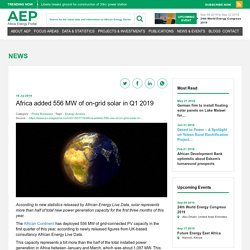
The African Continent has deployed 556 MW of grid-connected PV capacity in the first quarter of this year, according to newly released figures from UK-based consultancy African Energy Live Data. This capacity represents a bit more than the half of the total installed power generation in Africa between January and March, which was about 1,097 MW. This was, however, the lowest level of total new installed energy capacity achieved for the continent on a quarterly basis since 2011.
Despite a difficult start to the year, new additions for 2019 are expected to be in line with recent years, as a significant number of large state-owned power plants are scheduled to begin operating, according to the consultancy. Photo credit: qimono, pixabay. Africa Renewables Index [2016 Data] by Country. Africa: Renewable Energy Sources Could Be Cheaper Than Fossil Fuels Within 10 Years - UN-Backed Report.
A new United Nations-backed report has revealed overwhelming consensus that renewable power will dominate in the future, with many experts saying that even large international corporations are increasingly choosing renewable energy products either from utilities or through direct investment in their own generating capacity.
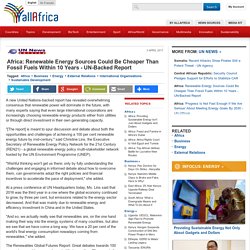
"[The report] is meant to spur discussion and debate about both the opportunities and challenges of achieving a 100 per cent renewable energy future by mid-century," said Christine Lins, the Executive Secretary of Renewable Energy Policy Network for the 21st Century (REN21) - a global renewable energy policy multi-stakeholder network hosted by the UN Environment Programme (UNEP). "Wishful thinking won't get us there; only by fully understanding the challenges and engaging in informed debate about how to overcome them, can governments adopt the right policies and financial incentives to accelerate the pace of deployment," she added.
Berkeley Researchers Map Out Renewable Energy Future For Africa. Clean Power Published on March 28th, 2017 | by Joshua S Hill March 28th, 2017 by Joshua S Hill Researchers from the University of California Berkeley have mapped out what they believe to be a viable strategy for Africa to steadily increase its development of renewable energy sources like wind and solar, while simultaneously reducing the continent’s reliance on fossil fuels and lowering power plant construction costs.
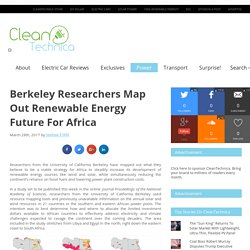
In a study set to be published this week in the online journal Proceedings of the National Academy of Sciences, researchers from the University of California Berkeley used resource mapping tools and previously unavailable information on the annual solar and wind resources in 21 countries in the southern and eastern African power pools. The intention was to best determine how and where to allocate the limited investment dollars available to African countries to effectively address electricity and climate challenges expected to ravage the continent over the coming decades. Énergies renouvelables : les 19 projets que l’Initiative africaine voudrait voir financés en priorité. Destiné à faire le point sur les soutiens financiers rassemblés depuis son lancement en 2015, le deuxième conseil d’administration de l'Initiative africaine pour les énergies renouvelables (AREI), réuni le 4 mars à Conakry, a également été l’occasion de mettre en avant 19 projets.
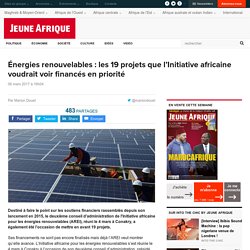
Ses financements ne sont pas encore finalisés mais déjà l’AREI veut montrer qu’elle avance. L’Initiative africaine pour les énergies renouvelables s’est réunie le 4 mars à Conakry à l’occasion de son deuxième conseil d’administration, présidé par le chef d’État guinéen Alpha Condé, président en exercice de l’Union Africaine. Ce conseil d’administration succédait à deux journées de réunions techniques avec les bailleurs de fonds, notamment l’Union européenne et la France, destinées à faire le point sur les financements. Nous allons demander à chaque partenaire de dire exactement le montant qu’il mettra et d’ici un à deux mois.
Small Hydropower Market - Africa Industry Analysis, Size, Share, Growth, Trends, and Forecast 2016 - 2024. LONDON, Feb. 21, 2017 /PRNewswire/ -- Small Hydropower Market: Overview Download the full report: Small hydropower (<10 MW) as compared to hydropower in Africa is an increasingly attractive solution in the countries of Africa.
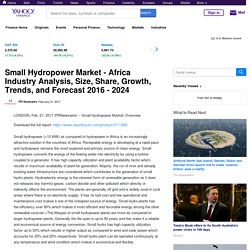
Renewable energy is developing at a rapid pace and hydropower remains the most explored and primary source of clean energy. Small hydropower converts the energy of the flowing water into electricity by using a turbine coupled to a generator. It has high capacity utilization and plant availability factor which results in maximum availability of plant for generation. Can wind and solar fuel Africa's future? Mainstream Renewable Power Jeffreys Bay Wind Farm in South Africa generates enough energy to power 100,000 homes there.
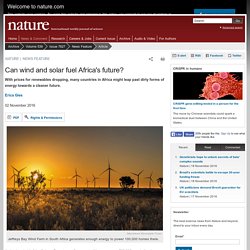
At the threshold of the Sahara Desert near Ouarzazate, Morocco, some 500,000 parabolic mirrors run in neat rows across a valley, moving slowly in unison as the Sun sweeps overhead. How green is Africa′s energy supply? Under the Paris Agreement, the world has committed to keeping global warming below 2 degrees Celsius – and ideally below 1.5 degrees.
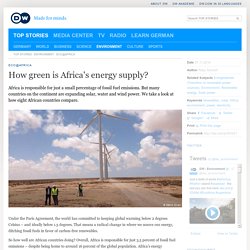
That means a radical change in where we source our energy, ditching fossil fuels in favor of carbon-free renewables. So how well are African countries doing? Overall, Africa is responsible for just 3.5 percent of fossil fuel emissions – despite being home to around 16 percent of the global population. Africa’s energy infrastructure is far less developed than in the carbon-heavy economies of America, Europe and China, for example. Solar could be a bright future for Africa as costs fall. Solar is a strong contender to bridging the energy gap throughout Africa, as installation costs fell by as much as 61 per cent over the past four years, the International Renewable Energy Agency (Irena) said today.
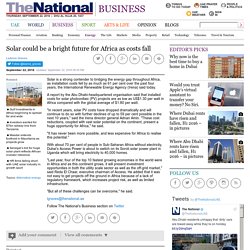
A report by the Abu Dhabi-headquartered organisation said that installed costs for solar photovoltaic (PV) projects are as low as US$1.30 per watt in Africa compared with the global average of $1.80 per watt. "In recent years, solar PV costs have dropped dramatically and will continue to do so with further declines of up to 59 per cent possible in the next 10 years," said the Irena director general Adnan Amin. "These cost reductions, coupled with vast solar potential on the continent, present a huge opportunity for Africa," he said. "It has never been more possible, and less expensive for Africa to realise this potential. "
Un vent de changement dans l'énergie en Afrique. Lancement du média ERA sur les énergies renouvelables en Afrique. African businesses go solar. Deutsche Welle.
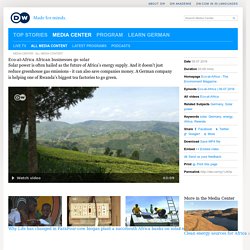
Africa must increase renewable energy generation by 650% to achieve 2030 goal. Power up: Delivering renewable energy in Africa, commissioned by IHS Towers, interviewed 28 experts including developers, technology companies, banks and energy analysts, supported by fieldwork in Nigeria, Zambia and Uganda.
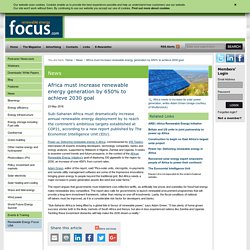
It seeks to examine current trends and future prospects, in the context of the African Renewable Energy Initiative’s goal of deploying 330 gigawatts to the region by 2030, an increase of over 650% from current rates. Adam Green, editor of the report, said:“Pico-solar units, microgrids, m-payments and remote utility management software are some of the impressive innovations bringing green energy to people beyond the traditional grid. IRENA Africa 2030 REmap 2015 low res. Fieldstone Africa launches investment index for renewable energy in Africa. Jun 13, 2016 12:44 CEST by Mariyana Yaneva The Fieldstone Africa Renewables Index (FARI), June 2016, All rights reserved. June 13 (SeeNews) - Financial advisor Fieldstone Africa last week launched an investment index for renewable energy in Africa. The ‘Fieldstone Africa Renewables Index (or FARI) is designed to assist investors, developers and financial institutions in comparing the relative merit of renewable efforts in different countries.
The index "takes into account real world experience as well as the legal, regulatory and technical basis to get things done," the independent financial advisor said in a statement. FARI groups countries into three specific distinctions. Africa Renewables Index [2016 Data] by Country. Energies Africaines le magazine des energies renouvelables en Afrique.
Africa in U.S.$12 Billion Energy Deal As Conservationists Raise Red Flag Over Dams. Photo: The Observer Works are ongoing at the 183MW Isimba dam that the World Bank is worried about over its environmental impact. By Jeff Mbanga Lusaka — Africa was presented with its largest energy deal ever - a $12 billion package from the Africa Development Bank - as some leaders fought off pressure from environmentalists concerned about the threat of an impending construction boom of power dams, reiterating their position that the continent was simply tired of being in the dark. Under the new deal, which was announced during the ADB's annual meeting in Lusaka last week, which ran under the theme Energy and Climate Change, the bank will spend $12 billion over five years. In addition, the bank will leverage at least $40 billion from other private sector players, such as sovereign wealth funds, private equity funds and pension funds, to invest in the energy sector as it tries to meet one of the key components in its High Five development agenda.
Alternative Energy Africa. Africa’s largest hotelier, currently with 116 hotels in 18 countries across the continent, launched a new sustainable development program. Accor announced at its ibis Dakar inauguration ceremony that it would expand objectives in sub-Saharan Africa by launching PLANET 21, a program covering health, nature, carbon, innovation, local development, employment, and dialogue that its hotels are required to meet by 2015. PLANET 21 includes an innovative program that uses an array of educational messages to inform and encourage customers to contribute actively to the hotels’ actions through a few simple gestures.
It plans to expand principally through its economy and midscale brands ibis and Novotel, but Accor will also expand through its Mercure and Pullman brands as and when opportunities arise in the most important cities. Madagascar, troisième pays africain à intégrer l'initiative « Scaling Solar - Communiqués de presse. DAKAR, Sénégal, 21 March 2016 / PRN Africa / — L'IFC, membre du groupe de la Banque mondiale, a signé un accord avec le gouvernement malgache pour la conception et la soumission d'une offre de partenariat d'énergie solaire dédiée à la production privée de 30 à 40 mégawatts d'énergie solaire raccordée au réseau, dans le cadre de l'initiative « Scaling Solar » qui vise la création d'un marché viable pour l'énergie solaire en Afrique. À Madagascar, troisième pays africain à intégrer l'initiative, une installation solaire à grande échelle constituera une solution définitive face aux longues coupures quotidiennes d'électricité.
Dans ce pays confronté aux problèmes de cout et de disponibilité de l'énergie électrique, les installations solaires constitueront une alternative à point nommé face aux groupes électrogènes coûteux. African Union Introduces $20 Billion Renewable Energy Plan. The African Union, an alliance of 54 countries, announced a plan to mobilize $20 billion to develop at least 10 gigawatts of renewable energy on the continent by the end of the decade. The African Renewable Energy Initiative was announced Tuesday at the United Nations climate summit in Paris. It will be hosted by the Abidjan, Ivory Coast-based African Development Bank, which will also act as a trustee, according to Alex Rugamba, director of energy, environment and climate change at the AfDB. The program is expected be partially funded from the $100 billion pledged by rich countries to fight climate change in the developing world.
The promise was made in Copenhagen in 2009 as wealthier countries with distant memories of their industrial revolutions prodded emerging economies to choose green rather than cheap. ACEC brochure 2014 FR. Building an African Clean Energy Corridor. Africa Clean Energy Corridor: Analysis of Infrastructure for Renewable Power in Eastern and Southern Africa. Africa Urged to 'Go Big' On Solar. Tumbling costs and technological advances mean solar energy could play a major role in an international project to expand electricity access in Sub-Saharan Africa, according to its organiser. "We think there's a tremendous opportunity to go much bigger on solar," Andy Herscowitz, coordinator of Power Africa, told attendees at the initiative's second annual summit, held in the United States on 28-29 January. According to the World Bank, about 600 million Africans have no access to electricity.
Power Africa, launched in 2013 by US President Barack Obama, is a partnership of more than 120 governments, companies, NGOs and academic institutions that seeks to give 60 million homes and businesses access to electricity and add 30,000 megawatts (MW) of power supply by 2030. Another 11,000 to 14,000 MW will come from new projects involving solar, geothermal, wind, hydroelectric and natural gas, as well as a few thousand more megawatts from making existing power supplies more efficient, it says.
Bringing better biodigesters and clean energy to Africa. Sub-Saharan Africa continues to suffer from a major energy deficit, with hundreds of millions of people lacking access to electricity and clean cooking fuels. There is a great need for innovative mechanisms that can help families access clean and affordable energy. The Carbon Initiative for Development (Ci-Dev) is one such mechanism. A $125 million fund with a pipeline of 14 pilot projects in Africa, Ci-Dev will help improve living standards and sustainable energy through results-based finance.
Along the way, it will generate valuable lessons in how reducing greenhouse gas emissions can generate tangible development benefits for local communities, like cleaner air, improved safety, and financial and time savings. These lessons can help in the delivery and scale up of innovative climate finance business models. 1. La révolution énergétique en Afrique est en marche. Jamais une espèce vivante n'a eu sur la Terre autant d'impact que l'Homme, pourtant nous n'avons qu’une planète. Aujourd’hui le monde prend conscience que nos modes de développement ne sont pas durables et que nous allons devoir profondément changer notre rapport à la nature pour préserver la vie sur terre. Anne-Cécile Bras vous propose de rendre compte de cette actualité sur tous les continents, pour décrypter les avancées ou les reculs de nos actions face à notre environnement en devenir. Africa: Wind and Sun Can Power End to Africa's Energy Poverty.
OpinionBy Ranjit Deshmukh & Grace Wu, University of California Nearly two decades into the 21st century, energy poverty continues to cripple Africa's social and economic development. Solarplaza New markets to watch in sub-Saharan Africa. Developers are beginning to find there is plenty of space for solar between North and South Africa. Thierry BARBAUT - i24News reportage énergies en afrique. Africa’s cities of tomorrow won’t need power stations. Énergies renouvelables : le potentiel de l'Afrique reste à exploiter. "Nous sommes disposés à prendre notre part à l’effort international visant à réduire les émissions de gaz à effet de serre, notamment en nous dotant d’énergies propres.
Mais nous avons besoin d’aide". Africa: Three More Countries Pledge to Join Africa's Solar Revolution. Press release Ghana, Malawi and Rwanda are the latest countries to join the Energy Africa campaign, International Development Minister Nick Hurd has announced. The agreements will see closer working between the UK and each country to power up the emerging household solar market across Africa. AfDB to support electricity access for all by 2030 with African Renewable Energy Initiative. Biomasse et énergie solaire pour électrifier les zones rurales au Ghana et Nigeria. ‘Vast’ energy value in human waste – UN. Urban Waste In Africa Offers Large Source Of Electricity. Africa Could Quadruple Renewable Energy Capacity By 2030. Urban Waste In Africa Offers Large Source Of Electricity.
Africa: Why African Energy Choices Need to Be Low Carbon - for the Continent's Own Sake - allAfrica.com. L’Afrique peut quadrupler la part des énergies renouvelables d’ici 2030. Renewable energy charges ahead in Africa. What makes renewable energy attractive to big investors? Africa's energy ‘black holes’— where riches await investors in megapower. Jatropha around the world: As SGB raises $11M, here’s a 13-country tour of development activity. Lifestyle - Clean energy: Africa lags behind despite potential.